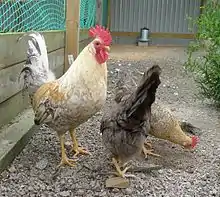Jærhøns
The Jærhøns or Norske Jærhøns is the only indigenous breed of domestic chicken in Norway.[6][7] It is named for the traditional district of Jæren in the county of Rogaland.[8]
 | |
| Conservation status | FAO (2007): not at risk[1]:86 |
|---|---|
| Other names | Norwegian: Norske Jærhøns |
| Country of origin | Norway |
| Traits | |
| Weight | |
| Egg colour | white |
| Comb type | simple |
| Classification | |
| APA | no[3] |
| EE | yes[4] |
| PCGB | no[5] |
| |
History
The Jærhøns was the principal chicken breed of Norway until imports of foreign breeds began in the nineteenth century.[2] The Jærhøns was selectively bred at the state-controlled breeding station at Bryne in Jæren from its establishment in 1916 until it closed in 1973. Breeding stock was then transferred to the state agricultural college at Hvam, Nes. Following work done in the first half of the twentieth century, the Jærhøns is auto-sexing.[6][9]
The Jærhøns was listed as a "conservation-worthy national breed" by the Norwegian Forest and Landscape Institute in its 2008–2010 action plan for the conservation and sustainable use of animal genetic resources in Norway.[10]
Characteristics
Two colour varieties are recognised for the Jærhøns, dark brown and yellow, and light brown and yellow. The comb is single, and the beak and legs are bright yellow.[2]
A bantam Jærhøns with the same two colour varieties was approved in 1994.[8]
Use
The Jærhøns lays approximately 215 eggs per year,[6] about 20% less than industrial purpose-bred layers. The eggs are white, and weigh a minimum of 55 g.[2]
References
| Wikimedia Commons has media related to Norwegian Jærhøne. |
- Barbara Rischkowsky, D. Pilling (eds.) (2007). List of breeds documented in the Global Databank for Animal Genetic Resources, annex to The State of the World's Animal Genetic Resources for Food and Agriculture. Rome: Food and Agriculture Organization of the United Nations. ISBN 9789251057629. Accessed September 2017.
- Jærhøns (in Norwegian). Nordiskt Genresurscenter. Archived 19 August 2014.
- APA Recognized Breeds and Varieties: As of January 1, 2012. American Poultry Association. Archived 4 November 2017.
- Liste des races et variétés homologuée dans les pays EE (28.04.2013). Entente Européenne d’Aviculture et de Cuniculture. Archived 16 June 2013.
- Breed Classification. Poultry Club of Great Britain. Archived 12 June 2018.
- Breed data sheet: Norsk jaerhona/Norway. Domestic Animal Diversity Information System of the Food and Agriculture Organization of the United Nations. Accessed August 2014.
- Breeds reported by Norway: Chicken. Domestic Animal Diversity Information System of the Food and Agriculture Organization of the United Nations. Accessed August 2014.
- Jærhøns (in Norwegian). Norsk Rasefjærfeforbund. Accessed August 2014.
- L. Finne, P. Tuff (1944). Inheritance of colour and sex identification of chicks by colour in Jaer fowls. In: Melding om skuleåret. Mysen, Norway: Statens småbrukslærarskule. Accessed August 2014. (subscription required)
- Nina Sæther (2009). Handlingsplan for bevaring og bærekraftig bruk av husdyrgenetiske ressurser i Norge 2008-2010 (in Norwegian). Norsk institutt for skog og landskap. Accessed August 2014.
Further reading
- T. Twito, S. Weigend, S. Bluma, Z. Granevitzea, M.W. Feldmand, R. Perl-Trevese, U. Lavib, J. Hillela (2007). Biodiversity of 20 chicken breeds assessed by SNPs located in gene regions. Cytogenetic and Genome Research 117: 319–326. doi:10.1159/000103194
- Nina Sæther, Anna Rehnberg (2016). Norsk Genressurssenters Handlingsplan for Bevaringsverdige Husdyrraser 2016-2019 (in Norwegian). Norsk institutt for skog og landskap.
- Nina Sæther, Alvilde Hovden, Peer Berg, Jessica Kathle, Cathrine Brekke, Linn F. Groeneveld (2018). Strategiplan for Genbanken for verpehøns 2018-2027. NIBIO.
- Nina Sæther (2017). Jærhøns (in Norwegian). Norwegian Genetic Resource Centre.
- Cathrine Brekke, Linn F. Groeneveld, T. H. E. Meuwissen, Nina Sæther, S. Weigend, P. Berg. (2020).Assessing the Genetic Diversity Conserved in the Norwegian Live Poultry Genebank. Acta Agriculturae Scandinavica, Section A — Animal Science, February. Taylor & Francis, 1–13. doi:10.1080/09064702.2020.1727560.